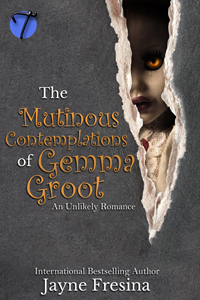The Mutinous Contemplations of Gemma Groot (An Unlikely Romance)(MF)
Twisted E-Publishing
Venetia Warboys, by most accounts, a mild-mannered, generous, church-going woman, had reached her thirty-fifth year with little out of the ordinary happening in her life. Until she decided, one evening, to rise from her neatly-laid dinner table, fetch an axe from the woodshed, chop her husband into pieces and bake his gristle into some pies.
"That's the last time he'll criticize my pastry," she said calmly when apprehended in the act of selling her grisly wares.
Although her husband had been an infamous philanderer— or as much of one as an oily, simpering blob of a man could be in a small, rural market town—nobody knew what had really happened, on that last day, to cause a deadly fissure in his wife's sanity. I was the only soul to whom she gave any clue, but the six words she once whispered into my ear left me, a girl of twelve at the time, with more questions than answers.
Suffice to say, after Venetia's axe swinging rampage in the autumn of 1882, the men of Withering Gibbet took greater care of what they said and did to their wives. We had all learned some important lessons: everybody harbors dark truths; there is no such thing as "ordinary", and never buy a savory pie at the county fair, especially when the contents are described as "revelation meat".
For many years Venetia was our town's sole claim to infamy.
And then there was me.
* * * *
So begins a story of silence and noise, secrets and lies, sisters and lovers, murder and redemption. Gemma Groot grows up in the long shadow cast by an old sin, but she is about to step out of the dark and shine the light on a few startling truths about her family. With the help of a man who falls out of the sky, she will finally discover the strength she needs to revisit the past and unleash the spirit of a wronged woman.
But will she find that some skeletons are better off left buried?

The Mutinous Contemplations of Gemma Groot (An Unlikely Romance)(MF)
Twisted E-Publishing
Introduction
Revelation Meat
One of the things I remember most about her, is that her nails were always well-tended, the fingertips blushing pink as the spring buds on her quince trees. Only later did I conclude that this effect was the natural result of meticulous scrubbing, necessary in the disposal of evidence.
Venetia Warboys, by most accounts, a mild-mannered, generous, church-going woman, attractive but of modest deportment, had reached her thirty-fifth year with little out of the ordinary happening in her life. Until she decided, one mellow, autumn evening, to rise from her neatly-laid dinner table, fetch an axe from the woodshed, chop her husband into pieces, and bake his gristle into some pies.
"That's the last time he'll criticize my pastry," she said calmly when they arrested her at the county fair on the common, where she was apprehended in the act of selling her grisly wares.
Although her husband, Delaford Warboys, had been an infamous philanderer— or as much of one as an oily, simpering blob of a man could be in a small, rural market town—nobody knew what had really happened on that last day to cause a deadly fissure in his wife's sanity. I was the only soul to whom she gave any clue, but the six words she once whispered into my ear left me, a girl of twelve at the time, with more questions than answers. Perhaps that was her plan.
Suffice it to say, after Venetia's axe swinging rampage in the autumn of 1882, the men of Withering Gibbet took greater care of what they said and did to their wives. We had all learned some important lessons: everybody harbors dark truths; there is no such thing as "ordinary", and never buy a savory pie at the county fair, especially when the contents are described only as "revelation meat".
All this must have made my father nervous. It was never easy to tell what went on in his mind, but my mother had always been louder and more demonstrative than her younger sister Venetia— certainly less tidy— and I often thought my parents' marriage might, one day, end in bloodshed too. The mounting frustrations were palpable at our table, and my father was, perhaps, wise to keep his wood-axe locked away. But women are resourceful and intuitive. When in need, we can always find a weapon to get our point across.
Casper Groot, my father, a man who makes an art out of ignoring the dangerous women who live in his house, could have no idea when, or from where, the blow would come. But surely he remembered his sister-in-law.
For many years Venetia was our town's sole claim to infamy.
And then there was me.





